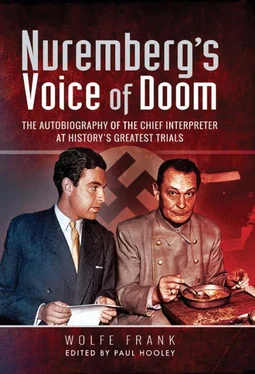We managed to smuggle a telegram of protest to the International Red Cross and a representative of that organisation put in an appearance shortly afterwards. He walked all over the camp, accompanied, of course, by Braybrook and whilst we could tell that he was visibly shocked he told us there was really nothing he could do. We were not German PoWs and the British Government did not have to answer to the German Government for anything happening to us, even if that involved violations of PoW conventions. He could, he said, ‘Do no more than make unofficial recommendations.’
After the Red Cross man had left, and during a meeting of all internees, a hunger strike was proposed and almost started. I got onto a table and made my first public speech, with a Sergeant sent by Braybrook listening.
‘This,’ I told the gathering, ‘is not England. We are the victims of one man who is exploiting his temporary powers. Ways can and will be found to put things right. However, if we stage a hunger strike, it will be Braybrook who makes out the report and it will most certainly turn the authorities against us. We might not have an opportunity to state our case and we would run the risk of being regarded as a bunch of troublemakers.’ I went on to suggest we should wait until the right opportunity presented itself at which time we could raise our grievances. I must have made a certain amount of sense because the idea of a hunger strike was dropped.
One of the officers came to our aid by suggesting we write a letter of complaint to the War Office – which Braybrook, under Army regulations, had to grant – we did but the result of that complaint never became known.
We were then ordered to prepare a nominal roll of all internees, to be made up by age groups: 18-25 years, 26-35 years, 36-50 years, 51-60 years and those over 60. Meanwhile Braybrook had hit upon an idea that he thought would torture us. He called us together at regular intervals to tell us of the latest successes of the Allied Forces, thinking we would hate to hear of defeats inflicted upon the Germans. He was quite surprised at the applause that greeted each of his announcements.
When the list of internees was complete, the Commandant addressed us once again. ‘The War Office,’ he pronounced, ‘had ordered the camp to be dissolved. Some of you will be sent to Australia, some to Canada and some to the Isle of Man. Transport will be leaving, according to age groups, starting tomorrow’.
The implication of this arrangement, I realised at once, was that every family in the camp would be split up. As Camp Leader I raised this point immediately. ‘That,’ said the Major ‘would be too bad and those are my orders.’
There were some heart-breaking scenes as we left the camp. An old blind man begged Braybrook to be allowed to stay with his son who led him about. Refused! An invalid, tears streaming down his face, implored the Commandant to let him remain with his two sons. Refused!
I stood near two of Braybrook’s officers whilst this was going on. ‘The bastard,’ said one of them, ‘he’s lying about those War Office orders.’
Thank God this all ended well. There ensued the most colossal muddle in connection with the shipments to Australia and Canada. In the end, nobody went, but a lot of luggage did. It was far better to lose that than a father, or a son, and they all were reunited on the Isle of Man.
For some of us however our troubles did not cease immediately.
We were put on a train to Glasgow, transferred to buses and taken to a camp that was beautifully situated in the hills of Scotland, near Dunoon. Glenbranter had been a forestry camp in the grounds of a fine old country house belonging to Sir Harry Lauder, the Scottish comedian. My group reached the camp at 21.00 hours. We de-bussed and were ordered to fall into ranks of three. We remained standing there for well over an hour, in the pouring rain. Then the Commandant appeared with a group of officers, all well protected by raincoats.
He inspected us, a roll was called and finally, after another forty minutes, we were designated huts, which contained the usual boards and trestle beds with one blanket each and no mattress.
The interpreter, Captain Smith, addressed us the following morning and introduced the Commandant Major Dunne. Then came a familiar note. We were told to behave. There was a war on. We had been locked up for good reasons – and ‘for the duration.’ We would be alright if we kept the discipline.
We did ‘keep the discipline’ but we weren’t alright. The food was appalling. We were refused a canteen and for weeks we were denied the right to write letters, and there was no sight of any incoming mail.
We complained to the interpreter and were immediately ordered on parade.
‘You had better stop complaining if you know what’s good for you,’ announced Smith sardonically. ‘You have every reason to be satisfied. If you were locked up in a Nazi concentration camp in your own country, you’d not be complaining. You’d be dead.’ All this was said in German in case we forgot who we were, and Dunne was standing by, loving it.
This time I got good and angry. A couple of days later we were given the special notepaper we were to use for letters, and I sat down and wrote to a Member of Parliament whom I knew, Sir Thomas Moore.
‘Is it necessary,’ I wrote, ‘that, because of the short-sightedness and ignorance of some officers, people in this camp, men who are genuine enemies and victims of the Nazi regime and true friends of this country, should be turned into embittered men and made to feel that Britain’s cause is no longer theirs?’ I then elaborated on the particular complaints we had.
Less than twenty-four hours later a sergeant burst into my hut. ‘Frank,’ he roared, ‘get outside the Commandant wants to see you.’ I got outside with a soldier with fixed bayonet either side of me. ‘Quick march,’ commanded the sergeant. I was careful not to be out of step. We went out of the gate and up to Sir Harry Lauder’s family seat, Dunne was seated behind a desk.
‘Are you internee number 12345, Frank?’
‘Mhm,’ I went.
Did you write this letter?’ and he read out all of it in a voice which was growing louder.
‘Definitely,’ I said.
‘Why do you make yourself the spokesman of a bunch of whining, complaining idiots who don’t know how well-off they are?’
No answer. I stared at him.
He put down the letter and leaned forward on his desk: ‘If I had my way I’d put the lot of you against the wall. You, Frank, belong in solitary confinement. What do you have to say?’
No answer. I stared at him.
‘I’ll tell you something Frank. I saw this letter when I censored it. You can insist on it being sent to the addressee. If you do, a copy will be sent to the War Office with my report that will show that you are a troublemaker, an anarchist. What’s your decision?’
I thought things over.
I knew that my goose would be cooked if Dunne wrote such a report. It would be his word against mine and if Sir Thomas decided to act on my letter, he would draw a blank.
I picked up the letter and tore it up.
‘Take him away,’ ordered Dunne, looking extremely satisfied.
I returned to my hut and copied the letter (I had kept a duplicate, of course) this time onto ordinary stationery. Another inmate of the hut removed the heel from his shoe and produced a stamp and a ten-shilling note.
Late that night, I crawled up to the barbed wire. I picked a little Scotsman who was doing guard. ‘Hey, Jock,’ I whispered, hoping that he wouldn’t shoot me immediately. Jock was a lousy soldier – he didn’t shoot.
‘Aye,’ he said and ambled over to me.
‘Listen, Jock, we’re having trouble with the Commandant. Will you help us?’
Читать дальше












